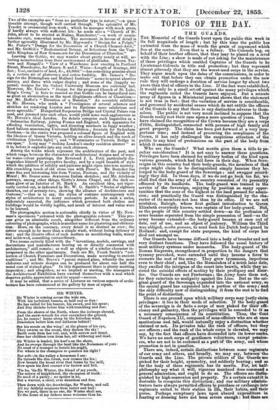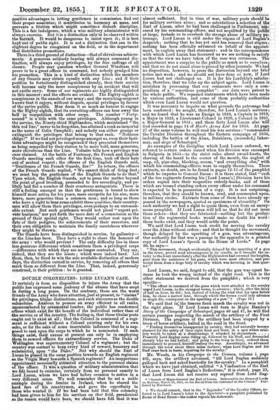TOPICS OF THE DAY.
THE GUARDS.
Tin Memorial of the Guards burst upon the public this week in its full magnitude of length ; but by this time the public has extracted from the mass of words the grain of argument which lies at the centre. Even that is a fallacy. The Colonels beg, on behalf of their brother officers, that they may be placed on a level* with the Line ; a show is made of not asking for the maintenance of those privileges which enabled Captains of the Guards to be Lieutenant-Colonels in title and promotion ; but they represent almost piteously that they are the worst-used corps in the service. They argue much upon the dates of the commissions, in order to make out that before they can obtain promotion under the new rule they will undergo a duration of service longer by about two years than that of officers in the Line. If the fact were established, it would only be a small set-off against the many privileges which the regiments called the Guards have enjoyed. But a minute array of figures in a Ministerial journal shows that the statement is not true in fact ; that the variation of service is considerable, and governed by accidental causes which do not entitle the officers of the Guards to say that there is any distinction adverse to them- selves. The public is not very much inclined to suppose that the Guards really rest their ease upon a mere question of years. They have claimed the recognition of the Crown because they are a eorps d'elite, distinguished, connected with persons of high family and
inop-
portune property. The claim has been put forward at a very -
time ; and instead of procuring the compliance of the Crown, it has only challenged the suspicious attention of the public to any kind of pretensions on the part. of the body from which it emanates.
Who are the Guards ? What merits give them a title to pe- culiar consideration ? It is not easy to answer these questions. Privileges have been claimed for military bodies of the kind upon various grounds, which had full force in their day. When Sove- reigns in this country had their body-guards, the members of that corps might claim to be distinguished simply because they be- longed to the body-guard of the Sovereign ; and swagger accord- ingly they did. In those days, if we do not go back too far, we shall find that the army of the country consisted of its peasantry officered by its landlords. The body-guard was trained in the service of the Sovereign, enjoying by position so many oppor- tunities that the sons of the highest in the land pressed for admis- sion; and practically the Guard was distinguished by the cha- racter of its members not less than by its office. If we are not mistaken, Raleigh, whose first gallant introduction to Queen Elizabeth everybody knows, was captain of her body-guard. But, as the people of this country settled down—as the profession of arms became separated from the simple possession of land—as the army became extended—the body-guard became at once out of date, out of use, and an object of jealousy. William the Third was obliged, multa geniens, to send back his Dutch body-guard to Holland; and, except for state purposes, the kind of corps has died out amongst us.
Our Guards have become diffused into a body of broader and not very distinct functions. They have followed the usual history of most military systems under monarchs. The body-guard of the Roman Emperors, strengthened in proportion to the dangers that tyranny provoked, were extended until they became a force to overawe the rest of the army. They grew tyrannous, imperious even to their chief; and, like the Mamelukes of a much later date, they swelled the intrigues of the court into brawls, while they as- sisted the suicidal effects of mutiny by their profligacy and disor- der. Our Guards are not Prietorians ' • the Army fears them not, for they entertain no malignity against the Line. But as the ori- ginal guard of the Sovereign expanded into the national army, so the special guard has expanded into a portion of the army; and the only difficulty now of distinguishing it from the rest is to find the point of distinction. There is one ground upon which military corps may justly claim privileges : it lies in their mode of selection. If the body-guard of the sovereign is de facto a corps of men picked for their effi- ciency and gallantry, then the privileges will be conceded to it as a necessary consequence of its constitution. Thus, the Cent Guard of Napoleon III, composed of sous-officiers who are at once meritorious and tall, would naturally enjoy a distinction whether claimed or not. Its privates take the rank of officers but they are officers ; and the rank of the whole corps is elevated, we may say, by the fact that officers have descended into its lower ranks. We have no such corps of gentlemen volunteers, except pension- ers, who are not to be reckoned as a part of the army, and whose promotion is not in question. There are, indeed, certain distinctions between some regiments of our army and others, and broadly, we may say, between the Guards and the Line. The private soldiers of the Guards are picked for their height, symmetry, and soldierly bearing; and so far the body of these regiments has its merits. For, let half- philosophy say what it will, vigorous manhood does command a general admiration, and ought to do so. The officers are distin- guished by high connexion and property. To a certain extent it is desirable to recognize this distinction ; and our military adminis- trators have always permitted officers to purchase or exchange into regiments suited to their station in life, their habits, and their purse. Perhaps sumptuary laws upon absurd expenditure in feasting or dressing have not been severe enough : but there are
positive advantages in letting gentlemen in commission find out their proper associates; it gontributes to harmony at mess, and prevents a friction which might sometimes disturb discipline. This is a fair indulgence, which a wise military administrator will always exercise. But it is a distinction only:to be observed within the barrack. It would be dangerous to insist upon it ; it is best kept out of public sight. It is not a distinction that can in the slightest degree be recognized an the field, or in the department that distributes promotions.
There is a third ground of distinction—that of chivalrous achieve- ments. A generous soldierly bearing will always command dis- tinction, will always enjoy privileges, by the free suffrage of all classes. - People may question -whether General Windham will prove to be a great officer in command, but nobody grudged him his promotion. This is a kind of distinction which the members of any Guards may obtain equally with any Line ; and if their position be fortuitously distinguished already, then their service will become only the more conspicuous by an accident that will not excite envy. Some of our regiments are highly distinguished in this manner ; and the effects are evident. The Eighty-eighth is conspicuous in the annals of our army ; and the recruiting-sergeant knows that it enjoys, without dispute, special privileges by favour of the entire public. Men deem it so much an honour to engage in the Eighty-eighth, that its recruiting-officers can bear away the bell in competition with other corps. The number "Forty- second" is it title with the same privileges. Although young in the service, the Ninety-third Highlanders, which maintained "the thin red line," never to be forgotten, has attained a rank as immortal as the name of Colin Campbell ; and nobody can either grudge or extinguish the privileges that belong to that rank. "Noblesse oblige!" If we had not privileged corps amongst us, even their facti- tious advantages might be recognized if they presented themselves as being compelled by their station to be more bold, more generous, more chivalrous than the 'Line. Voltaire tells how a privilege was once claimed. At the battle of Fontenoy, the French and English Guards meeting each other for the first time, took off their hats out of mutual respect ; the officers of the English Guards said, "tentlemen of the French Guards, fire !" In return, the officers of the French Guards replied, "We cannot think of firing first ; we must beg the gentlemen of the English Guards to do that." Upon which, the English Guards, not to press the matter beyond the point of good breeding, proceeded to fire accordingly, and po- litely laid flat a number of their courteous antagonists. There is still a feeling amongst us that the gentleman is bound to show himself more active for his years, more energetic for his size, more brave, more genercius than a common man ; and so long as those who have a right to bear arms exhibit these qualities, their country- men will allow them their privileges, even perhaps to an unreason- able extent. But such gentlemen would not plead "urgent pri- vate business," nor put forth the mere date of a commission as the ground of their special right. They would rather rest upon the crate of their pedigree, the achievements of their ancestors, and their own obligation to maintain the family escutcheon wherever they might be thrown.
The Guards have been distinguished in service, by gallantry— as the Line has been. They have a right to share the honours of the army : who would prevent ? The only difficulty lies in those less generous differences which constitute them a privileged corps —differences with which they are no longer contented. They say, indeed, that they are the losers ; which were indeed hard. Let them, then, be freed to win the sole available distinction of modern days, the distinction earned in service, by removing all others that mark them as different from the Line. That, indeed, generously eonatrued, is their petition : be it granted.



































 Previous page
Previous page